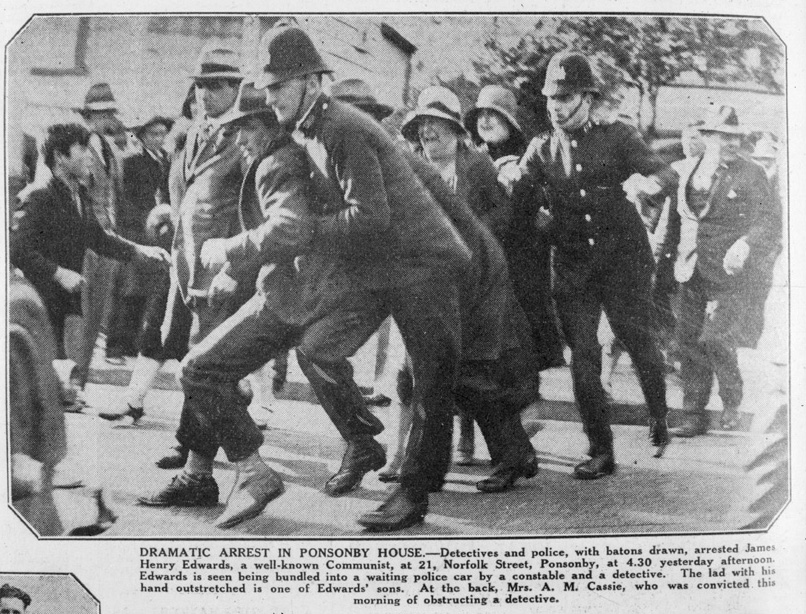In 2008 the Human Rights Commission (HRC) reported that trans people faced “pervasive and entrenched barriers to the enjoyment of the same rights and responsibilities as other New Zealanders.” What a diverse range of people had had in common was “the struggle to come to terms with who they are, to have others accept them and to be able to live fulfilled lives in the sex they know themselves to be.” Respondents reported discrimination, harassment and abuse.
What gains have been made since 2008 in legal rights, access to healthcare, employment rights and positive representation in the media have been thanks to trans people’s own tireless organising and self-advocacy. Trans people have been their own advocates in the health and education systems, organising in their own defence, to counter, as one trans man submitting to the 2008 report put it, “headlines that display us as frauds and freaks.”
Bigots would have us believe that the increasing visibility of trans people and their struggle for dignity is a product of “trans ideology”. The supposed aims of this agenda are variously to enforce a particular set of views about sexuality and gender, to convert the young and vulnerable to “transgenderism”, or to aid and abet predators. In reality, trans people are active across the political spectrum and have at least as broad a set of views on gender and sexuality as any other section of society. But the struggle for trans rights, in challenging the institutions which enforce and maintained gender norms, throws up broader political questions. Socialists support this questioning and this struggle. Hitting back against misrepresentations of “gender ideology”, Judith Butler recently described “gender theory” as seeking “a form of political freedom that would allow people to live with their “given” or “chosen” gender without discrimination and fear”. That freedom is at the heart of the socialist project.
Fight the Lies
The current hand-wringing about “trans ideology” represents, at its roots, a backlash from the right. It echoes 1980s homophobic scaremongering.It was the Catholic Church that led the anti-trans charge in 2004 and 2016, issuing warnings about the threat trans visibility posed to the gender ideology. Demagogues like Trump in the USA and Bolsonaro in Brazil have emboldened transphobic forces internationally. In New Zealand the most recent development is the emergence of the group “Speak up for Women” (SUFW). SUFW oppose the proposed Births, Deaths, Marriages, and Relationships Registration Bill that would make it easier for people to change the sex on official documents. Their rhetoric is utterly reactionary. They are promoting these bigoted ideas vigorously.
Worryingly, with the help of SUFW the anti-trans backlash has spread beyond the ranks of outspoken conservatives like Family First and is swaying some on the left. Many of those publicly fretting about trans rights claim that they don’t have anything against trans people per se. We need to be clear, though, that scaremongering about “gender ideology” rests on the implicit assumption that there is something wrong with being trans, and that the backlash against trans rights represents an attack on trans people.
Challenge Gender Ideology
Marx once said that the dominant ideas of any era are those of its ruling class. It has become a common tactic on the right here as elsewhere to present the exact opposite as being true. “PC”, we are to believe “has gone mad”, and it is the most marginalised groups in society who now hold ideological sway. As socialists we need to be clear about the real balance of power, and recognise that the most powerful ideology shaping ideas about gender is that of capitalism.
While contemporary capitalist societies may be finding some room to accommodate gender diversity – as they did for divorce, single parents and homosexuality – it is far from the dominant ideology of capitalism. Capitalism is built on rigid gender divisions which serve many purposes including the coercion of women into unpaid domestic labour. These divisions have always been justified with reference to supposedly inherent gendered traits. As capitalism expanded across the globe indigenous societies were forced, violently, to fit this mould. In New Zealand these divisions persist: around half of workers are in sex-segregated industries and workers in female-dominated industries continue to be paid significantly less than workers in male-dominated ones.
While expectations around gender have shifted, there is still huge pressure to naturalise gender roles and punish those who deviate from them. Women, historically, have been barred from political participation, education, financial independence, bodily autonomy and employment in certain sectors, and have had to fight hard for every right they have gained. Homosexuality was not decriminalised until 1986. Police harassment and assault of those targeted for “impersonation” the 1960s and 70s was routine. More than one contributor to the 2008 Human Rights report recounted being caught trying on the “wrong” clothes as a child and being told “you will go to jail for that.” Even the human body does not sufficiently conform to the sexual edicts of capitalism. It is still legal and routine for intersex infants to be subjected to surgery to make them conform to sexual norms.
Yet human diversity persists. As struggle throws up opportunities to explore new possibilities and articulate new identities – or in the case of takatāpui and others, to reclaim old ones – it should be role of socialists to embrace and encourage this struggle.
Bodily Autonomy
Reactionary transphobes think the state ought to be able to dictate what others do with their bodies. SUFW objects to the fact that with the proposed changes to legislation the state will no longer mandate certain medical procedures before an individual can change the details on their birth certificate. The right to bodily autonomy is a basic social tenet. Medical transition can be life-changing for trans individuals, but if, when and how they undertake it should be a matter of personal choice, not bureaucratic box-ticking.
Transphobic rhetoric presents trans individuals with a double bind, because while groups like SUFW encourage suspicion of individuals who do not medically transition, there is also abundant controversy (and misinformation) surrounding medical transition itself, and those who do choose this path. To set the record straight: Medical transition is not the only path trans people might choose to go down, and are not obliged to undertake any single set of procedures. The most common treatment is hormone replacement therapy (HRT), which involves regular doses of sex hormones that produce certain physiological changes.
Contrary to popular myth, children are not routinely being prescribed HRT. Transition for children usually means being referred to by their chosen name and pronouns, and allowed to dress as they wish. Children under 16 will sometimes be given puberty blockers, a treatment commonly used in cases of precocious puberty. This simply delays the onset of puberty and is reversible. For adults, access to HRT treatment has become easier in recent years but is still uneven. Other procedures are still difficult to obtain and rarely publicaly funded. Surgery referrals for genital gender affirmation surgery have jumped five-fold since a cap was lifted in October last year, but waiting times are still too long. People wanting these treatments often have to seek them overseas at their own expense. “Trans Health Care Now“ is a slogan the movement is embracing.
With the evolution of medical technology it has become commonplace for people to alter and augment our bodies, from contact lenses to organ transplant. This should be no big deal. The contraceptive pill, for example, is an everyday item. Yet some procedures continue to generate more controversy than others. Medical transition meets opposition because individuals who choose this option are seen to be violating the supposedly immutable qualities that separate men and women and define their destinies. Much is made, for example, of the fact that some procedures that some trans people undergo cause infertility, meaning that they cannot have children in the traditional way. This is treated not as a matter of personal choice but of public concern. In fact, there is a distinct tendency in transphobic rhetoric to reduce people to their reproductive functions. It is not hard to see the overlap between the fight for medical transition and the broader fight for reproductive freedom. Cis women who have sought abortion, contraception or voluntary sterilisation will recognise many of the ideological barriers placed between trans people and bodily autonomy.
Sexual Violence and Scapegoating
The most hateful transphobic rhetoric is that which paints trans people as a danger to cisgender women. SUFW promotes this, working hard to link transgender women to sexual violence. This is cruelly ironic: trans individuals are in fact far more at risk of being victims of sexual violence. The 2015 U.S. survey found that 47 percent of transgender people are sexually assaulted at some point in their lifetime. In addition to this, the scapegoating of trans people for sexual violence promotes the reactionary view that gender non-conformity indicates sexual perversion, and distorts the reality of sexual violence.
In New Zealand, one in three girls experience sexual assault by the age of sixteen. Up to one in five women experience sexual assault as an adult. Advocacy group Mosaic estimates that one in six New Zealand males are sexually abused. What truly puts paid to the myth of the monster individual is that around 90 percent of sexual violence is committed by someone known to the victim. Perpetrators of the trans predator myth make the public toilet or changing room the main site of anxiety around sexual violence. But the most dangerous place for women is the home. In 2016, there were 118,910 family violence investigations by NZ Police. The workplace is also a site of danger, with sexual harassment the norm for many women workers in the hospitality industry in particular. New Zealand also has an very high rate of child abuse, with 13,966 substantiated findings of child abuse last year. Most of this takes place in the home, but the government has recently commissioned an inquiry into the widespread sexual abuse of children in state care. All of this clearly indicates a deeply rooted, systemic problem, and one in which the key institutions of capitalism – the state, the nuclear family, the workplace – are all implicated. For those with a stake in the current system it is safer to facilitate the scapegoating of a particular minority for sexual violence than to allow the implications of this to be examined too closely.
Solidarity and Sexual Liberation
Some of those opposing trans rights identify as feminists. Yet, by reducing gender oppression to some innate biological difference between men and women, this feminism reproduces mainstream justifications for women’s oppression. SUFW’s website is full of this illogic, with its myriad references to “male biology” and “male pattern violence.” Biological essentialism offers absolutely no way forward in the fight for sexual liberation and women’s equality. In fact, the proponents of this ideology make it very clear that this is the case. Because sexism is rooted in biology, it is intractable. Rather than universal human rights and the elimination of sexual violence from our society, the best we can hope for is something called “sex-based rights” and the shelter of state-enforced sexual segregation. Trans and gender-nonconforming people can expect nothing better than a strictly-policed existence at the margins of society, if they are permitted to exist at all.
As socialists, we believe that gendered oppression is generated by the workings of the capitalist system, and is not a product of biology or an eternal feature of human society. We believe that with a radical reordering of society genuine equality and sexual liberation is possible, and that the only force which can bring this about is the working class in all its diversity. This means accepting the challenge of overcoming, through joint struggle, the oppressions and prejudices that divide us. Believing that this is possible, and urgently necessary, is the difference between pressing forward in the spirit of solidarity and retreating into fear and division. This means that standing up against transphobia is not only a matter of moral urgency, but crucial for the success of our movement.
Image credit: Gender Minorities Aotearoa









